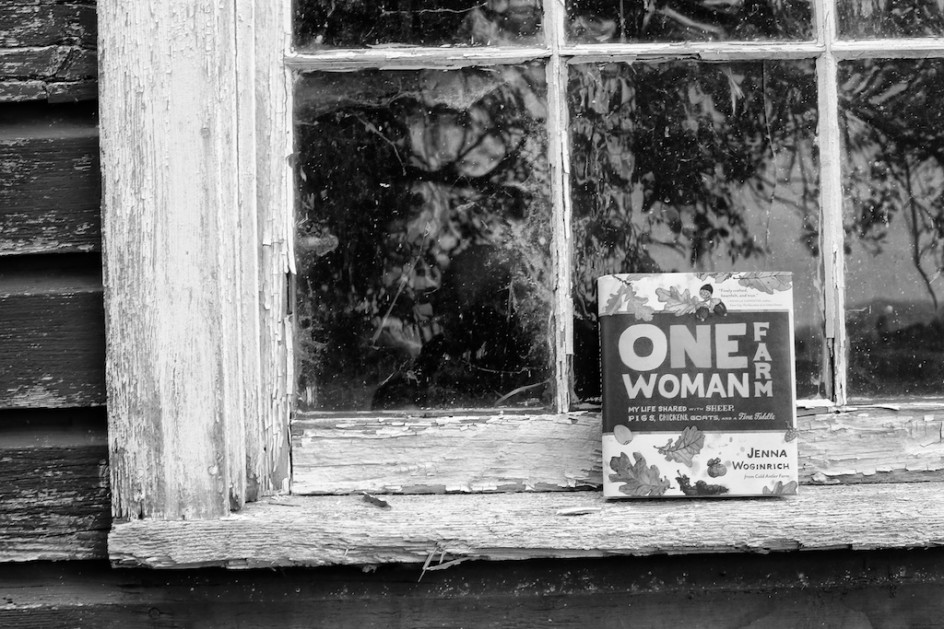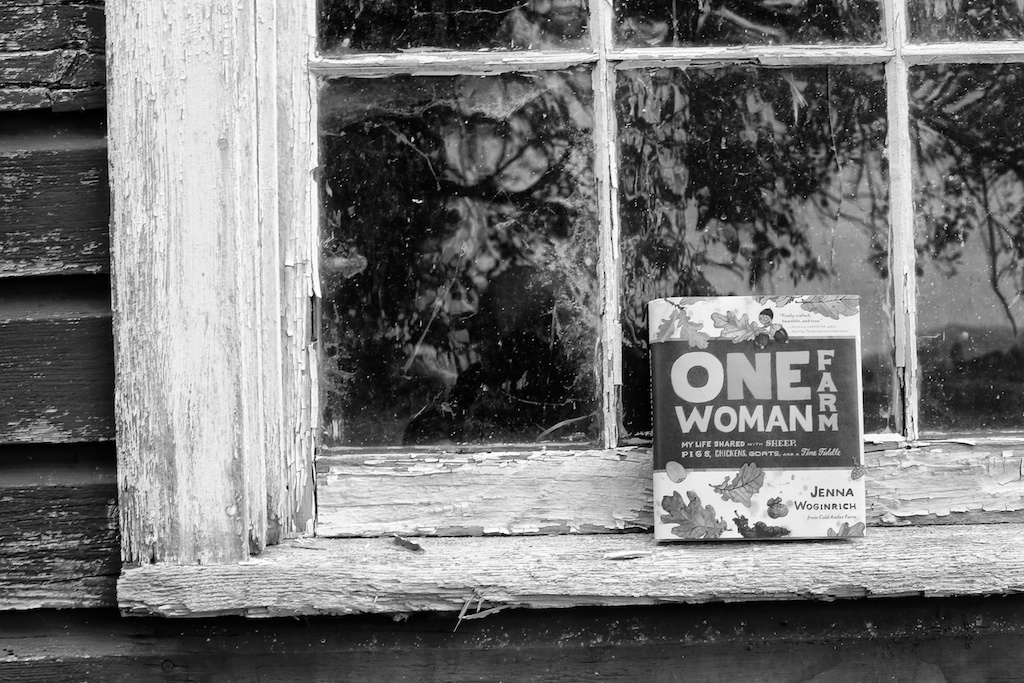
If you wish to purchase this book, please consider pre-ordering it or ordering it from your local independent bookstore or from Battenkill Books, Jenna Woginrich will personalize and sign any books ordered through Battenkill. Her book launch reading and party will be held at Battenkill Books, 7 p.m., October 11. You can order the book online or call the store at 518 677-2515.
It is a great American irony that even as family farms are near extinction – battered by corporate competition, dismissed by economists as inefficient in the global economy, betrayed by politicians and government, smothered by excessive regulation and undercut by Americans who increasingly buy the worst possible food at the cheapest possible prices – more and more people, especially younger people are drawn to the idea of them as achingly appealing alternatives to life in the Corporate Nation.
Farms, like animals, are increasingly romanticized as sylvan oases, the perfect life.
Jenna Woginrich has written a heartfelt book about her farm, “One Woman Farm,” (Storey Publishing), it is wonderfully written and beautifully illustrated. Full disclosure: I was asked to write a blurb for the book, which I happily and sincerely did, I called it “sweet and powerful,” and “touching, elegiac, smart and informative.” It is all of those things and more, I recommend it to anyone who is interested homesteading, farming, and, as important, the struggle for a meaningful life.
The book covers one year in the life of Jenna Woginrich, a young seeker, blogger, writer, homesteader and refugee from corporate work. It runs from October to October (her favorite time of year,) the book chronicles the joyous and intense rituals of her new life – raising animals (and eating them), growing as much of her own food as she can, dabbling in the Celtic Mythology that seems almost to consume her, loving her border collie Gibson, and taking a great leap of personal and economic faith by buying a Fels Pony named Merlin, a central character and experience in the book and an animal, says Jenna, who changed her life.
In “One Woman Farm,” as in her blog, Jenna attributes a great deal to her animals, and she especially credits Merlin with giving her courage and the community she has always sought but never had.
Jenna is a model of enterprise and energy, as is clear in the book, a little crazy sometimes, often bloody but never bowed. When she decided to become a writer, she skipped all of the whining and drama that sinks so many writers, she just went online, e-mailed some publishers, got a contract and wrote four books in nearly as many years. Not many people do that in this world, at any age. “One Woman Farm” is, I think, the best and most compelling of her books, a big step forward for her writing. It is the story of what human passion and courage can accomplish – at any age. Jenna is enthusiastically controversial, she is drawn to arguing with animal rights activists and fellow homesteaders who question some of her methods and priorities. She is also sensitive, these battles seem to wound her as well as anger her.
But she is not running for Congress, she takes her own path, makes her own decisions, comprehensible or not. Merlin changed her life, but also challenged it, she once wrote that he was the “best worst mistake” of her life.
Jenna likes to live close to the edge and her reasoning is simple: “It’s harder to fail when success is your only choice for survival. At this point, my Old World is so far away, so foreign to what my life has become, I do not know if I could turn back.” She doesn’t sound as if she ever intends to, and I doubt that she ever will. Jenna is one of those people who will find a way to make it work.
In addition to her writing, Jenna has finely honed survival skills, she has a great gift for using technology to promote and sustain her life and for mastering things like fiddle-playing, rabbit slaughtering, archery and Falconry, as well as New England cheesemaking. She is almost ruthlessly industrious about finding ways to support her small farm, nestled on a hillside in Washington County, N.Y.: her blog, ads, subscriptions, patrons, friends who come rushing to help out, bartering, workshops, even the sale of her treasured personal possessions and animals when things get tight. She writes that she and religion have parted ways, but farming has given her a faith: “My life is entirely about commitment now, and I find myself praying more than ever before, mostly out of sheer gratitude for my land and the air in my lungs.”
It is not a simple thing to buy a farm when you are 30, stock it with chickens, goats, horses, sheep, dogs, cats, rabbits and turkeys and run the place by yourself.
Jenna is an especially gifted writer, and “One Woman Farm” shines from beginning to end, a lyrical walk through one passionate person’s dream that sometimes reads like a powerful fairy tale. I recommend it highly.
If there is a caveat to the book, it would be this, something I feel obliged to say. Jenna and I live nearby and are friends. We are alike in some ways and different in others, and I have great respect and admiration for her and what she has accomplished in her young life. I bought a farm too, and sometimes wrote about it in much the same way. I called it my “City Of God,” my shining city on a hill. My farm, I wrote, became my mother, my faith. It transformed me and my life. I need to say, though, that farms are not soft and sylvan places, they are rarely lyrical and mystical, and readers of Jenna’s popular and often riveting blog will know what readers of “One Woman Farm” may not: farms are stinky, dirty and tough, as so many young idealists are learning every day.
Of June, Jenna writes: “I am happy to start the day in the barn, welcome the morning in the river with my fly rod, and then return home for a nap in the hammock and a light lunch before I am sent into the fields again.” It does sound pretty idyllic.
I am not a farmer, but a writer who lives on a farm, and I think buying my farm saved my life and nearly destroyed it, farms can burnish the soul, and drain them in a hurry, my farm was difficult and challenging beyond my imagination, I started out in a panic and stayed there for years. Farms are expensive, most of them fail, and quickly. They are labor intensive and tough on middle-aged knees and joints. They are rife with grinding chores, interactions with extreme weather, flies, ticks and all kinds of animal waste. Raccoons kill chickens, rats invade kitchens, animals bust through fences, buildings collapse and fences rot. The young farmers seeking to reform the way we live and eat are running into all of problems, from getting their produce to market to competing with the Wal-Marting of America – most Americans just do not think about what they eat or how they get it – to an economic agri-system system built around bigness and influence.
I was startled to learn that so many people – especially those online – were yearning for my life, my perfect life, how many wanted a farm. A lot of people tell me this, but few actually do it. I have no regrets, but at least I know why now. I learned on my farm(s) that a perfect life is never perfect. A perfect life is one filled with joy and sadness, crisis and mystery, fear and excitement, loss and gain, all met with grace and self-awareness.
Jenna’s book is a mystical window into this life, you will love reading it. But be a bit careful, maybe take a look at the blog too.

